|
|
|
Sort Order |
|
|
|
Items / Page
|
|
|
|
|
|
|
| Srl | Item |
| 1 |
ID:
097096
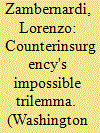

|
|
|
|
|
| Publication |
2010.
|
| Summary/Abstract |
Ever since the conventional wars in Iraq and Afghanistan turned into irregular conflicts, both students of war and practitioners have furiously debated counterinsurgency's logic, goals, and chances of success.1 Counterinsurgency doctrine, however, has experienced no radical change since its original development. It was originally, though not systematically, formulated in the twentieth century by none other than the British officer, T.E. Lawrence, and later extended, on the basis of the writings of Mao, by a variety of counterrevolutionary strategists such as the French theorists of la guerre revolutionnaire. Even the new counterinsurgency doctrine devised by General David Petraeus in Iraq and Afghanistan does not represent a fundamental shift away from its traditional understanding, which sees this type of conflict as a contest for the support and control of population and, in turn, places the security of the populace at the hub of military operations.
|
|
|
|
|
|
|
|
|
|
|
|
|
|
|
|
| 2 |
ID:
155147
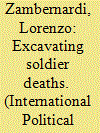

|
|
|
|
|
| Summary/Abstract |
This study argues that warfare is permeated by attitudes toward death, and that the history of war is also a history of these changing attitudes. By focusing on body disposal and burial practices, the article traces when and how soldiers—once regarded as simple military instruments—started to be conceived as individuals qua individuals, eventually becoming the hardly expendable beings that we know today. Although a focus on disposal and burial practices might sound fanciful, how corpses are dealt with can suggest whether, and in what ways, individuals are important to the living. It can also shed light on the origins of a variety of current phenomena, such as casualty sensitivity, post-heroic warfare, and risk-transfer militarism.
|
|
|
|
|
|
|
|
|
|
|
|
|
|
|
|
| 3 |
ID:
105652
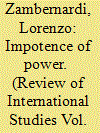

|
|
|
|
|
| Publication |
2011.
|
| Summary/Abstract |
When former US ambassador to Pakistan, Wendy Chamberlin, said of the US, 'We are a player in the Pakistani political system', she was pointing out how challenging it is to achieve US policy goals under the kinds of volatile political conditions engulfing that country. In late 2007, the Bush administration was banking on the political future of former Prime Minister Benazir Bhutto, who had recently returned to Pakistan, and was still providing President Pervez Musharraf with the substantial aid and support it had been giving him since 9/11. And yet by early 2008, Benazir Bhutto was dead, assassinated as she rose from her car to greet crowds of supporters, and Pervez Musharraf was a political liability, since his party had suffered a resounding defeat in the February 2008 election. These events demonstrated that even the foreign policies of a country as powerful as the US can be scuttled by the flux and flow of local power politics.
|
|
|
|
|
|
|
|
|
|
|
|
|
|
|
|
| 4 |
ID:
184044
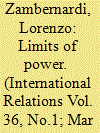

|
|
|
|
|
| Summary/Abstract |
Hans J. Morgenthau’s contribution to international relations and political theory appears to have been fully recognized to date. However, his ideas have undergone surprisingly little comprehensive investigation: an attitude that made it possible to grasp only a few aspects of his reflections. The main argument of this article is that the main area of inquiry in Morgenthau’s scholarship – international politics and foreign policy – is based on general considerations regarding the role of reason in politics and the limits of knowledge of the social universe. Not only does the question of the possibility of such knowledge lie at the root of his considerations on political action, but it also forms the mainspring of his reflection on ethics. Through an inquiry into the red thread that tightly links his diverse body of thought on social sciences, ethics, and foreign policy, the article aims to show that Morgenthau was a systematic political thinker who set out from theoretical observations on the limits of knowledge to develop particular insights into ethics and, from there, a particular notion of how foreign policy should be conducted. In other words, Morgenthau established links of essential continuity between knowledge, ethics, and action.
|
|
|
|
|
|
|
|
|
|
|
|
|
|
|
|
| 5 |
ID:
178558
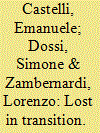

|
|
|
|
|
| Summary/Abstract |
Mao’s military teachings have greatly affected the development of modern counterinsurgency. Although the influence of Mao’s doctrine on modern counterinsurgency has been examined, scholarship has failed to highlight that the reception of Mao’s writings and deeds is based on a misreading of his theory and strategy. In the transition from Maoist people’s war to COIN, two aspects of the former were lost. Firstly, for Mao the use of force remained the decisive instrument in war. Secondly, whereas for COIN the security of the population is a crucial goal, for Mao the population was a mere instrument that could be sacrificed if the conditions of the conflict so required.
|
|
|
|
|
|
|
|
|
|
|
|
|
|
|
|
| 6 |
ID:
191011
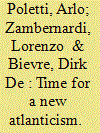

|
|
|
|
|
| Summary/Abstract |
There has been no shortage of critiques of the EU-China Comprehensive Agreement on Investment (CAI) signed on 30 December 2020. Many have perceived the CAI as a snub in the face of the Biden administration, which has the potential to jeopardise one of the most important strategic goals of the transatlantic alliance: setting aside four years of Trump’s populist economic policy and working in close coordination with a view to developing a united front to contain China. While the CAI does indeed indicate that the EU considers itself a fully autonomous international economic player, however, such a display of autonomy need not be incompatible with a stronger transatlantic alliance. In fact, the CAI may be an opportunity for the transatlantic alliance to evolve into a partnership among equals that is necessary to successfully navigate the uncharted waters of the coming global (dis)order.
|
|
|
|
|
|
|
|
|
|
|
|
|
|
|
|
|
|
|
|
|